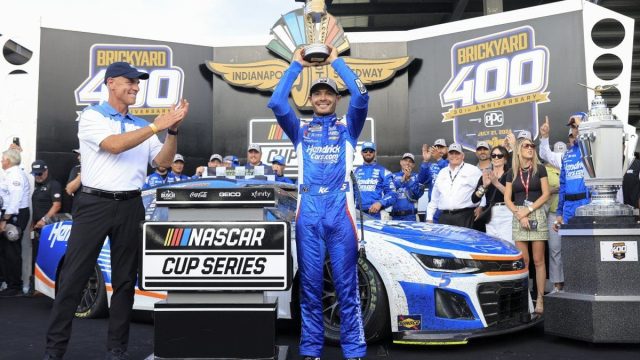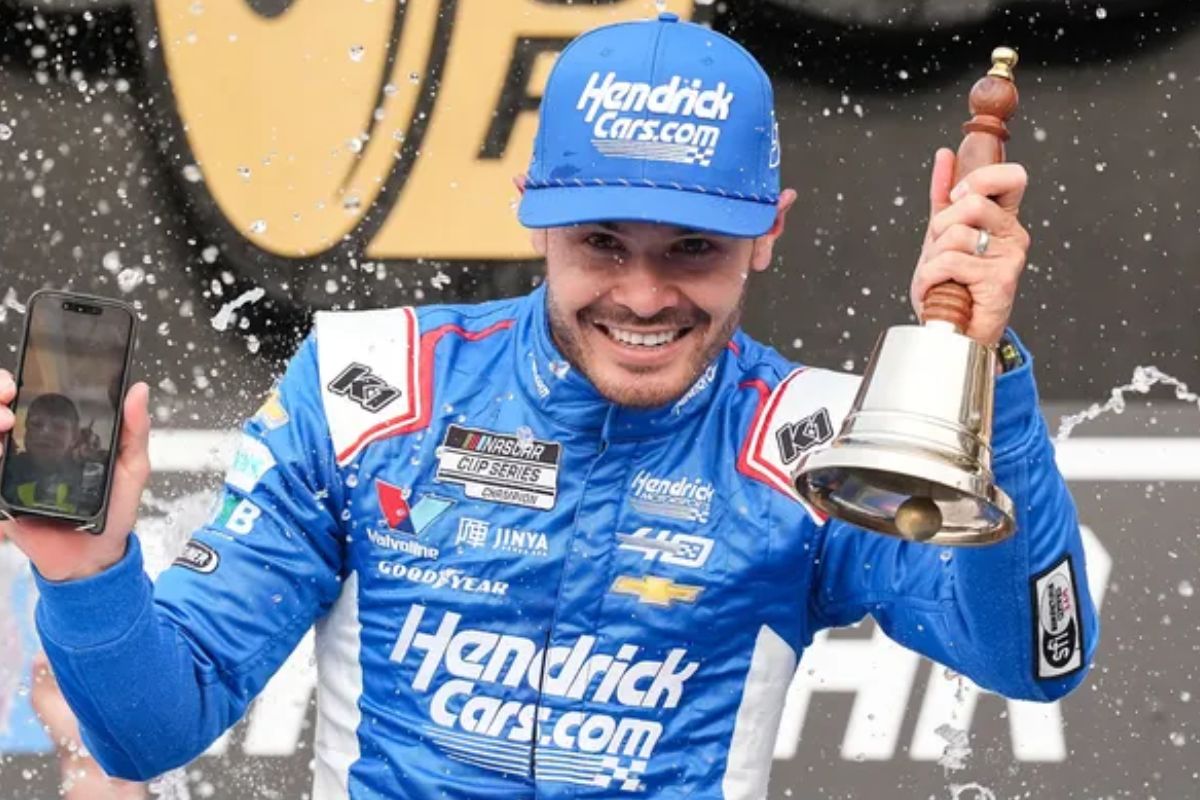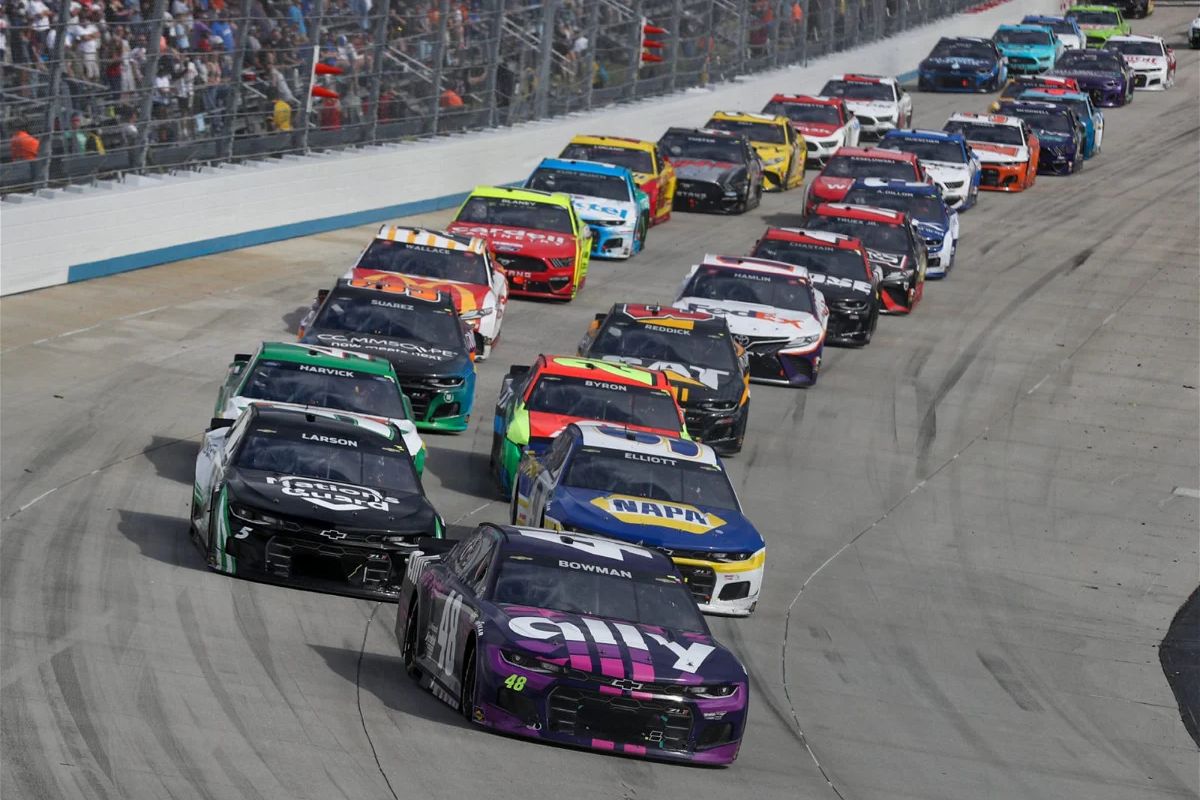Kyle Larson’s Brickyard 400 Win: Kyle Larson‘s recent victory at the Brickyard 400 has once again cast a spotlight on the persistent controversies surrounding NASCAR’s restart protocols. The criticism over Larson’s early acceleration during a crucial moment raises notable questions about the consistency of officiating and the implications for competitive fairness. This incident not only echoes previous disputes but also highlights a growing demand for greater transparency in rule enforcement. What might this mean for the future of NASCAR’s officiating standards?
Key Highlights
- Kyle Larson’s win at the Brickyard 400 reignites questions over NASCAR’s restart officiating, particularly concerning consistency and favoritism in rulings.
- Controversial incidents, like those involving Keselowski and Blaney, highlight the impact of tactical decisions on race outcomes and perceptions of fairness.
- NASCAR’s decision not to penalize Larson for restarting actions sparked debate about officiating standards and their effect on competitive integrity.
- The disparity in officiating, as seen with Ty Majeski’s restart penalty versus Larson’s compliance, raises questions about fairness in NASCAR’s rule enforcement.
Larson’s Victory and Controversy
Kyle Larson’s success at the Brickyard 400, his fourth of the season, has not only emphasized his racing abilities but also reignited discussions surrounding NASCAR’s controversial officiating practices. Criticism has intensified regarding the inconsistency of rulings, particularly in high-stakes situations where the outcome can dramatically affect driver standings and team strategies.
Larson’s victory at the Indianapolis Motor Speedway, an iconic venue, should have been a moment of unbridled celebration. However, the overshadowing discourse about officiating practices suggests a deeper malaise within the sport. Critics argue that the perception of favoritism—especially toward Hendrick Motorsports—worsens existing tensions among teams and drivers, further polarizing the fanbase.
The implications of such controversies extend beyond a single success. They challenge the very foundation of NASCAR’s credibility and fairness, essential elements that sustain competitive integrity. As Larson continues to demonstrate his skill on the track, the questions surrounding NASCAR’s officiating will persist, prompting stakeholders to advocate for reforms.
The need for transparency in decision-making processes has never been more vital ultimately determining its future path in an evolving motorsport landscape.
Incident with Brad Keselowski and Ryan Blaney
The controversial incident involving Brad Keselowski and Ryan Blaney during the Brickyard 400 has sparked considerable debate among fans and analysts, emphasizing the complexities of race dynamics and officiating in NASCAR. As the race approached its critical crossroads, Keselowski’s decision to pit due to fuel exhaustion left him vulnerable, allowing Larson to capitalize on the situation.
At the moment of the restart, Larson, who had been running in the third position, found himself in a unique position. Keselowski’s exit from the track coincided with Larson’s opportunistic advance, which some observers argue may have been premature. This raises questions about the integrity of the restart sequence and whether Larson’s early acceleration constituted a violation of NASCAR’s restart rules.
Kyle Larson Onboard Camera – Indy Oval Overtime Restart Attempt #1 pic.twitter.com/H1fv7xgleC
— FeignedKey479 (@FeignedKey479) July 21, 2024
Blaney expressed frustration over how the situation unfolded. As a teammate of Keselowski, the implications of the restart extended beyond mere positioning; they highlighted the details of team dynamics and tactical decision-making under strain.
The incident serves as a case study on how split-second decisions can redefine race trajectories and provoke inspection from both fans and officials. Ultimately, it demonstrates the ongoing challenges NASCAR faces in maintaining a level playing field while steering through the high-stakes environment of competitive racing.
NASCAR’s Decision and Reactions
How NASCAR navigates the fallout from its decision not to penalize Larson has ignited widespread debate, revealing the complexities and inconsistencies within the sport’s officiating framework. The ruling, which deemed Larson’s actions during the restart as compliant, has drawn ire from both drivers and fans similarly, leading to questions about the integrity of NASCAR’s officiating standards. This incident highlights how subjective interpretations can influence outcomes, leaving many stakeholders feeling disenfranchised.
The controversy surrounding Larson’s non-penalty echoes previous incidents, particularly Denny Hamlin’s late-race restart at Richmond, where the governing body likewise opted against enforcement. Hamlin’s admission of early acceleration raises further concerns about the criteria used in evaluating restart infractions. Critics argue that such discretion creates a perception of favoritism and undermines the principle of equal enforcement across the board.
As fans dissect these decisions, the potential ramifications for NASCAR’s credibility are substantial. Trust in the officiating process is paramount for maintaining the integrity of the competition.
The organization faces a critical crossroads: it must either clarify its guidelines to guarantee consistency or risk alienating its fan base and competitors. Ultimately, the reactions to Larson’s win serve as a microcosm of broader issues within NASCAR, demanding a reevaluation of how the sport defines and enforces its rules.
Past Controversies
Numerous past controversies within NASCAR have consistently highlighted the challenges of enforcing rules uniformly, often leaving fans and drivers questioning the integrity of the sport’s officiating. One prominent incident occurred during the 2019 FireKeepers Casino 400 at Michigan International Speedway, involving Martin Truex Jr. and Joey Logano. As the race approached its finale, Logano appeared to jump the restart, with Truex Jr. closely trailing in third. Despite protests from Truex Jr. and other drivers, including Kyle Busch and Kurt Busch, NASCAR found no evidence to warrant punishment, as four cameras monitoring the restart zone did not raise any red flags.
This incident presents a broader pattern in NASCAR where the perception of inconsistency in rule enforcement raises critical questions about the sport’s governance. The absence of definitive penalties in situations like these often leads to frustration among competitors, who feel that the rules are applied subjectively. The implications extend beyond individual races; they can affect championship standings and the drivers’ trust in the officiating process.
This tendency to overlook potential infractions can foster an environment where drivers may feel incentivized to push the boundaries of acceptable behavior during critical moments. As NASCAR continues to navigate the complexities of officiating, the need for transparency and consistency in rule enforcement remains paramount in preserving the sport’s credibility and ensuring that all participants feel they are competing on a level playing field.
Ty Majeski’s Experience
Ty Majeski’s experience during the TSport 200 serves as a striking example of NASCAR’s ongoing challenges with restart violations, mirroring the controversies that have previously plagued the sport. In a race characterized by both victory and tension, Majeski’s expedition unfolded with the backdrop of a restart infraction that could have derailed his performance.
Majeski hit with a jumping the restart penalty!
He drops to 34th as Christian Eckes is now battling Enfinger for the lead.#TSport200
— Stephen Stumpf (@stephen_stumpf) July 20, 2024
Despite a dominating presence throughout the event, his early misstep during the restart—where he was penalized for jumping ahead—placed him at the rear of the field, exposing the inconsistencies inherent in NASCAR’s enforcement of restart rules. This incident highlights the precarious nature of NASCAR’s officiating, where the outcome of a race can pivot on subjective rulings.
While Majeski rallied impressively, ultimately leading the final 56 laps and securing success, the episode raises critical questions about fairness and consistency across the series. The contrast with Kyle Larson‘s experience at the Brickyard 400, where restart violations went unpunished, emphasizes an unsettling disparity that could greatly influence championship standings.
Majeski himself characterized the restart penalty as “a close call,” suggesting an awareness of the razor-thin margins that define competitive racing. His ability to overcome adversity not only exemplifies his skill but also reflects the broader implications of NASCAR’s regulatory environment.
News in Brief: Kyle Larson’s Brickyard 400 Win
Kyle Larson’s success at the Brickyard 400 emphasizes the persistent challenges surrounding NASCAR’s restart regulations.
The criticsims of Larson’s early acceleration highlights a broader issue of officiating consistency within the sport.
As past controversies resurface, the need for transparent rule enforcement becomes increasingly essential to uphold competitive integrity.
Ensuring that all teams and drivers comprehend and trust the application of rules will ultimately foster a more equitable racing environment and improve the sport’s credibility among its fanbase.
Our Reader’s Queries
Q. Has Kyle Larson won the Brickyard 400 before?
A. Kissing the bricks in May. Larson was hesitant to call his first Brickyard 400 victory – his third Cup ‘crown jewel’ win – the biggest moment of his 11-year career.
Q. Who won the Brickyard 400 in Indianapolis?
A. Kyle Larson found redemption at Indianapolis Motor Speedway, winning the Brickyard 400 in double overtime on Sunday. He vowed to return next year and take another shot in an Indy car.
ALSO READ: NASCAR Shows Bias Towards Kyle Larson Amid Restart Controversy, Says Veteran



